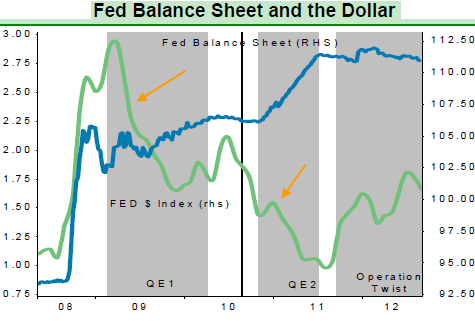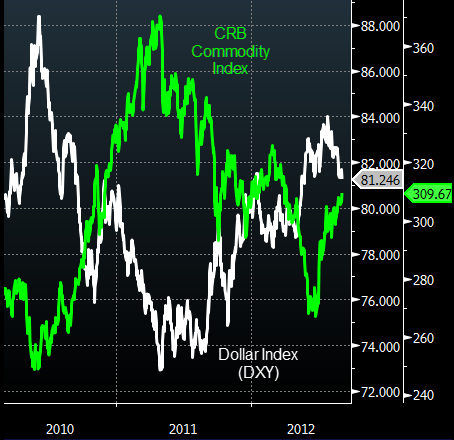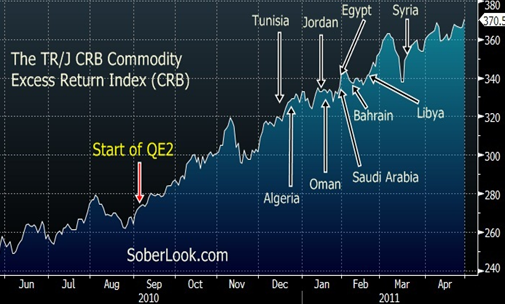Economists continue to insist that there is no connection between the Fed's monetary expansion programs and increases in commodity prices, particularly agricultural products globally (discussed here). Here is a typical comment:
If it is commonly believed that the FOMC can cause a worldwide food shortage then we are truly in a dark age of macro. The FOMC has no ability to raise the price of commodities relative to national income, and I can't even imagine the rationale that monetary expansion could somehow increased prices internationally (that is, denominated in foreign currencies).
The only way they could raise food prices in real terms is if they could spur increased food consumption domestically, which would be much more likely if they strengthened the dollar than if they weakened it. The FOMC can cause a lot of trouble, but this is just not on the list of problems they can cause, and certainly not via monetary expansion.
Unfortunately macroeconomic theory here diverges from market experience. Monetary expansion in the recent past corresponded with significant dollar weakness. The chart below shows the dollar weakening during both QE1 and QE2. "Twist" on the other hand did not involve monetary expansion and only focused on reducing the average duration of Treasurys.
Dollar weakness to any commodity trader is a signal to buy - which is not necessarily linked to demand fundamentals. Those who don't believe this should only take a look at the following chart comparing the dollar (DXY) with the CRB commodity index.
What's important to point out here is that the commodity price movements have been much larger than the dollar movements. In fact on a percentage basis the CRB range in the graph above is almost double the dollar range. That means even for currencies that are not in any way tied to the dollar (although a number of emerging market currencies are), when the dollar weakens, commodity prices move higher even if denominated in these other currencies.
Commodity price increases due to dollar weakness therefore propagate globally even in nations whose currencies are not linked to the dollar. This empirical relationship drives global commodity markets even if supply/demand fundamentals don't warrant such adjustments. But when one faces tight and uncertain supply conditions to begin with (as we have now for agricultural commodities), dollar weakness will force an even larger commodities swings to the upside.
In 2011 the CIA was chastised for not being able to see the Arab Spring coming. Where did all that pro-democracy fervor come from all of a sudden? Why wasn't the CIA able to see key signs of the movement earlier? The answer has less to do with zeal for democracy and more to do with not being able to buy food. As food prices spiked across the Arab world, so did the protests.
Certainly in the long run, macroeconomic fundamentals should play out. But we don't live in "the long run." Global markets take seconds to reprice, usually far overshooting/distorting the "fundamentals." And, as the Arab Spring showed, people don't wait for these fundamentals to settle to their expected levels.
- English (UK)
- English (India)
- English (Canada)
- English (Australia)
- English (South Africa)
- English (Philippines)
- English (Nigeria)
- Deutsch
- Español (España)
- Español (México)
- Français
- Italiano
- Nederlands
- Português (Portugal)
- Polski
- Português (Brasil)
- Русский
- Türkçe
- العربية
- Ελληνικά
- Svenska
- Suomi
- עברית
- 日本語
- 한국어
- 简体中文
- 繁體中文
- Bahasa Indonesia
- Bahasa Melayu
- ไทย
- Tiếng Việt
- हिंदी
Monetary Expansion, The Dollar, And Commodity Prices
Published 09/03/2012, 02:08 AM
Updated 07/09/2023, 06:31 AM
Monetary Expansion, The Dollar, And Commodity Prices
Latest comments
Loading next article…
Install Our App
Risk Disclosure: Trading in financial instruments and/or cryptocurrencies involves high risks including the risk of losing some, or all, of your investment amount, and may not be suitable for all investors. Prices of cryptocurrencies are extremely volatile and may be affected by external factors such as financial, regulatory or political events. Trading on margin increases the financial risks.
Before deciding to trade in financial instrument or cryptocurrencies you should be fully informed of the risks and costs associated with trading the financial markets, carefully consider your investment objectives, level of experience, and risk appetite, and seek professional advice where needed.
Fusion Media would like to remind you that the data contained in this website is not necessarily real-time nor accurate. The data and prices on the website are not necessarily provided by any market or exchange, but may be provided by market makers, and so prices may not be accurate and may differ from the actual price at any given market, meaning prices are indicative and not appropriate for trading purposes. Fusion Media and any provider of the data contained in this website will not accept liability for any loss or damage as a result of your trading, or your reliance on the information contained within this website.
It is prohibited to use, store, reproduce, display, modify, transmit or distribute the data contained in this website without the explicit prior written permission of Fusion Media and/or the data provider. All intellectual property rights are reserved by the providers and/or the exchange providing the data contained in this website.
Fusion Media may be compensated by the advertisers that appear on the website, based on your interaction with the advertisements or advertisers.
Before deciding to trade in financial instrument or cryptocurrencies you should be fully informed of the risks and costs associated with trading the financial markets, carefully consider your investment objectives, level of experience, and risk appetite, and seek professional advice where needed.
Fusion Media would like to remind you that the data contained in this website is not necessarily real-time nor accurate. The data and prices on the website are not necessarily provided by any market or exchange, but may be provided by market makers, and so prices may not be accurate and may differ from the actual price at any given market, meaning prices are indicative and not appropriate for trading purposes. Fusion Media and any provider of the data contained in this website will not accept liability for any loss or damage as a result of your trading, or your reliance on the information contained within this website.
It is prohibited to use, store, reproduce, display, modify, transmit or distribute the data contained in this website without the explicit prior written permission of Fusion Media and/or the data provider. All intellectual property rights are reserved by the providers and/or the exchange providing the data contained in this website.
Fusion Media may be compensated by the advertisers that appear on the website, based on your interaction with the advertisements or advertisers.
© 2007-2025 - Fusion Media Limited. All Rights Reserved.
